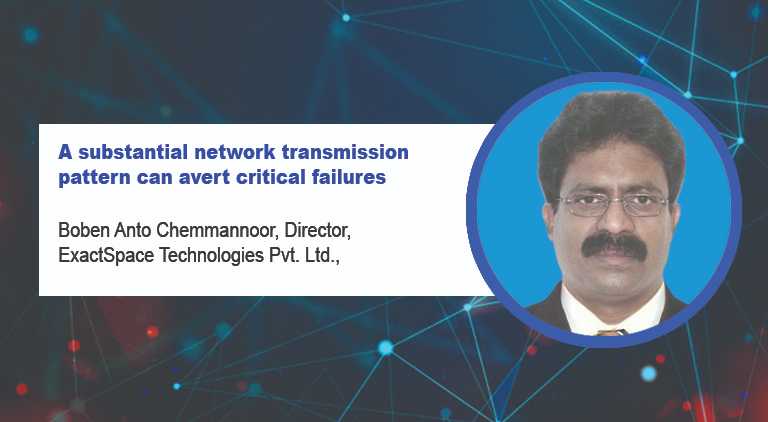A substantial network transmission pattern can avert critical failures
By EPR Magazine Editorial February 27, 2021 11:39 pm IST
By EPR Magazine Editorial February 27, 2021 11:39 pm IST

in an interview with EPR Magazine, talks about the critical aspects towards power transmission and distribution. He also suggest smart metering and prepaid metering to cut down additional consumption and losses.
Improving distribution gap
When we talk about the gap in the power distribution, it’s vital for us to consider that the distribution structure in India, is not at really that great. Huge subsidies are being provided by the DISCOMs, which acts as a barrier to put the net metering policy in place, to an extent. And these structural issues have been affecting the DISCOMs health, their recovery, further limiting the structural improvement of DTs to few states.
Also, if you see, earlier we had LT meters installed in most of the places. Whereas, today we have metering systems of 20 kV, 32 kV amongst the others. These installations have lowered the power purchase and the power tariff related costs. Most of the companies have PPA for bring effectiveness in their systems. So, the average cost of selling and power purchase vary and this very aspect has been bridging the distribution gap.
People and the companies nullifying the subsidiary as distribution has incurred more losses to the distribution sector in the last 5 – 6 years. But the situation today has different, it has changed to the domical improvement of collection v/a supply. with the structure of 50 years of time, we can identify the unhealthy distribution transformers and distribution network which can be impacted due to the critical environmental conditions, unlike the foreign countries. Most of the countries has safeguarded their systems to meet the power requirement on a concurrent basis. Financial support to meet this requirement stands in thousands of crores, but the unreliability of distribution leads to excess power of a generator.
Re-evaluating the debt value through govt schemes
A couple of schemes like UDAY 1.0, UDAY 2.0 and Urja are drafted by the Government of India to curtail the distribution losses and for the betterment of DISCOMs and the power sector. UDAY 1 and UDAY 2.0 are intended at capitalise the debt and convert them into zero debt. With these inventions, the Power Ministry is trying to convey that such schemes will change the debt value into positive and will become bankable.
If you want efficient and concurrent power supply, you must agree to the planned distribution cost and implement the same for a long term. If there are indifferences in the hydel load and the industrial load, distribution collection becomes deteriorated. Most of the companies relying upon the solar and wind energy, are sustainable because the impact of coal prices hasn’t affected them.
Implementing time-based tariffs
Dealing with cyber security issues
Cyber-attack isn’t really an alarming concern, as our grid are more about distributing the price and availability and not the distribution pattern. Moreover, except smart metering and smart cities, nothing can be so alarming for the cyber systems. Even today we are not entirely equipped with automatic switching or automated grid control system, but with the idea of smart cities one can create a fake meter among the available thousands of meters, and that will be the biggest concern for us, amidst all the other suggested or suspected ones as they actually are critical to get exposed to cyber-attack.
We are definitely familiar to the ‘California Syndrome’, which can be averted by redirecting the operational systems to a dedicated line instead of combining them to the internet line, because, this will certainly let the power line lead to that particular system, further averting the possible chances of cyber-attack. If the controllers of a smart city or a smart grid are protected properly there will be least or no chances of cyber breach. National grid and power grid are operated via separate systems like the internet protocol systems. IP protocol provides with a cloud-based system only for monitoring purpose.
Having a substantial network transmission pattern
Having a substantial network transmission outline is a vital necessity. This is primarily due to our vulnerability towards climatic impacts like cyclone, floods or a major system defang. We must believe in installation of connected cable and connected underground systems where some basic electricity supply for a house or a building is on cables and rest major supply will be via underground cable which will reduce the negative impacts generated from the calamity.
Also, our transmission losses are directly proportional to the voltage level. Depending on the load and criteria, it’s a mandate to have a multi-voltage level metering system, along with conditional monitoring and predictive maintenance systems for certain analysis and survive or to avert failures.
______________________________________
Transmission losses are directly proportional to the voltage levels, so predictive maintenance and conditional monitoring deter power failures.
Boben Anto Chemmannoor, Director, ExactSpace Technologies Pvt. Ltd.
We use cookies to personalize your experience. By continuing to visit this website you agree to our Terms & Conditions, Privacy Policy and Cookie Policy.